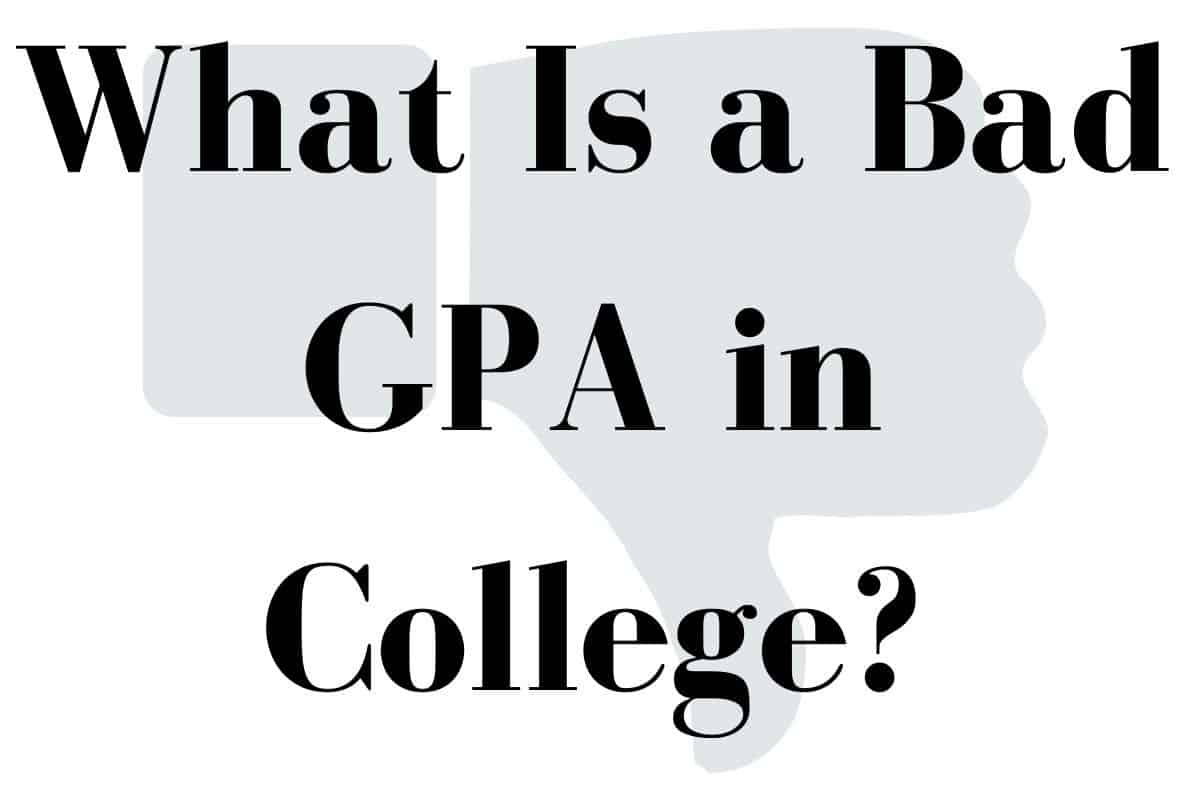When looking at your GPA, it can be difficult to know if your GPA is bad, an even when you know your GPA is bad, you may wonder how bad it really is and why a bad GPA matters.
Let’s look at what a bad GPA is, why it matters, what causes a bad GPA, how to cope with a bad GPA, how to improve your GPA, and what to do if you graduate with a bad GPA.
To know if your GPA is bad, you first have to know your GPA. Learn How to Find Out Your GPA .
.
What is a bad GPA in college?
A bad GPA is subjective since it varies depending on the college, degree program, industry, and personal standards. A bad GPA is below the average or expected GPA. In general, anything below a 2.5 or 3.0 GPA (out of 4.0) is considered a bad GPA.
A bad GPA is one that is below the:
- minimum requirement for graduation
- expectations for their college, degree program, or scholarship
- average college GPA
- goals that a student sets for themself
Ultimately, you have to define what you consider a bad GPA for yourself, but let’s look at the information to consider to help you do that.
Too bad to graduate
A GPA below the minimum GPA to graduate college is unequivocally a bad GPA. Most colleges require a minimum cumulative GPA of at least 2.0 (a C average) for students to graduate and often a required 2.0 GPA for classes in their major.
Some colleges or majors may have a higher minimum GPA of 2.5 or even 3.0 to graduate.
You can find your college’s and degree program’s minimum GPA requirement from your academic advisor or on their website.
Find out more about What GPA Do You Need to Graduate College?
Academic expectations
Any GPA below the expectations of their college, degree program, scholarship, or potential graduate school is considered a bad GPA.
Different colleges have different GPA expectations, and within a college, their different degree programs have different expectations (and even requirements).
If a degree program is prestigious or competitive—such as medical, engineering, or business—they may have a higher GPA requirement. You should learn what this requirement is because if your GPA is lower than it, you may be forced to change majors.
Scholarships can also have GPA requirements—make sure that you note down any requirements for your scholarships and meet them.
Finally, graduate schools often require at least a 3.0 GPA for admissions, so anything below that would be considered a bad GPA.
A below 3.0 GPA cutoff is also a common view for employers that care about GPA. However, many employers do not ask about GPA.
Below average
Another way to define a bad GPA could be anything below average. The average GPA will vary depending on your college and major, but in general, the average college GPA is 3.15. Anything below a 3.15 GPA would be below average and could be considered a bad GPA.
This average was determined by a study of over 400 schools.
of over 400 schools.
Personal goals
As long as you meet your graduation, degree program, and scholarship GPA requirements, anything beyond that is up to you to decide if it is a good or bad GPA.
Consider your personal goals, the effort you know you are exerting, and your history.
If you know you are going into a hard industry or want to go to graduate school, your goal should be a higher GPA.
If you know you are doing your best, your current GPA might be good for you. However, if you are not studying or doing all your assignments, you can get a higher GPA and might want to set a higher personal goal.
Additionally, consider your history. A straight “A” student and a student who has struggled to pass classes in the past will have very different ideas of what constitutes a bad GPA.
Try to set realistic expectations for yourself.
Click hereto check out the most popular products for college students.
What is a bad GPA in college first semester?
People can think that what is considered a bad GPA differs for your first college semester compared to all the others.
A lower GPA in the first semester of college is understandable because students are in an adjustment period. However, the same standards still apply, and a bad GPA can be viewed as anything below a 2.5 or 3.0 GPA (out of 4.0).
If you get a low GPA in your first semester of college, remember that this doesn’t have to be indicative of how the rest of your academic career will go. There is a learning curve, and you can still learn and implement all the skills you need to succeed.
The positive of it being your first semester is that you have more time to improve your GPA.
Check out all the benefits of Prime Student. Click here
to sign up for Prime Student.
Why does it matter if you have a bad GPA?
Having a bad GPA can have serious consequences. A bad GPA can:
- cause you to be on academic probation (often if below a 2.0), which means that you have to get your GPA up, or you will not be able to register for any more classes
- force you to change majors
- cause your financial aid to be revoked
- limit scholarships
- cause scholarships to be withdrawn
- limit internship opportunities
- cause you not to be admitted to graduate school
How to deal with having a bad GPA
To cope with having a bad GPA, you will need to work on your mindset.
1. Stop catastrophizing
To start, you need to stop catastrophizing.
Try to keep some perspective about all the problems that people can have. A bad GPA is not ideal and should be addressed, but it is not the end of the world.
2. Learn from mistakes and adopt a growth mindset
Next, think about what you can learn from having a bad GPA and adopt a growth mindset.
A growth mindset means that you know you can grow from challenges and adversity. Your skills and intelligence are not set but can be improved with hard work.
Recognize that you have the power to become a better student.
Additionally, focus on your personal growth and what you are learning, not just your grades.
3. Set realistic expectations
You need to set realistic expectations for yourself. As discussed earlier, a straight “A” student and someone who has trouble passing classes cannot have the same expectations for themselves.
You also have to take into account other extenuating circumstances, such as family obligations, work, grief, or disability. You need to consider what you already have to deal with when setting academic expectations for yourself and set goals for yourself.
Understand factors that caused you to have a bad GPA
Before you can improve your GPA, you have to understand what caused you to have a low GPA, such as:
- Did you not go to class or complete the assignments? The problem and solution is clear.
- Were you overwhelmed and had too many obligations? Family obligations or work can lead to problems with academics, as can making too many social commitments. If this is your problem, you need to talk to your family, friends, or boss and create a study plan for when you can dedicate your time to school.
- Do you have a disability, mental health struggles, addiction, etc… If so, you need to see your healthcare team (including doctors and therapists) and meet with your college’s Disability Services department to talk about getting accommodations.
- Do you have problems with motivation, time management, or self-discipline? Work on improving those skills.
- Do you have poor study skills? Learn how to take notes and study.
Do some serious self-reflection to understand what has caused your low GPA. You could also consider talking to friends, classmates, your TA, professors, or a therapist to help you determine why you struggled.
Once you know why you got a low GPA, you can know what issues to address.
How to improve your bad GPA
The biggest thing you need to do to improve your GPA is address the issues you determined caused you to struggle.
Beyond that, let’s look at what else you can do to improve your GPA.
1. Retake classes
Students can utilize their college’s grade forgiveness policy and retake classes they did badly in to improve their GPA by replacing that bad grade with a better one.
Learn more about Retaking College Classes .
.
2. Make a schedule
It is obvious, but it is worth noting that you must do the work and make an effort to do well in school! That requires prioritizing your schoolwork and making a schedule to study.
Having a clear schedule helps you manage your time and ensures you have the time you need to do well on your assignments and study. It also makes sure you are organized and know when assignments are due.
A schedule also helps you create a routine that makes it easier to get into the habit of studying and not rely as much on motivation and self-discipline.
2. Practice good study skills
- Go to class.
- Participate in group discussions.
- Practice active listening and take good notes
 .
. - Read all of the required materials.
- Do all your assignments and know the material covered.
- Study regularly instead of cramming before the exam.
- Learn how to write good essays.
3. Get help
Don’t be afraid to take advantage of the support available:
- talk to your professor to ask how you are doing and get advice
- use available tutoring
- join or start your own study group
What to do if you graduate with a bad GPA?
If you are not able to get your GPA up and you graduate with a bad GPA, it will be okay.
Graduating with a bad GPA does not significantly hurt job prospects since you can leave it off your resume, and many employers do not ask about GPA. A bad GPA does matter for grad school—explain in your essay, score high on entrance exams, and get experience in your field.
If you are asked about your low GPA, be honest—explain why you struggled and what you learned. Then, focus on the skills you learned and your strengths.
Check out more advice for navigating both the job search and graduate admissions with a bad GPA.
for navigating both the job search and graduate admissions with a bad GPA.



